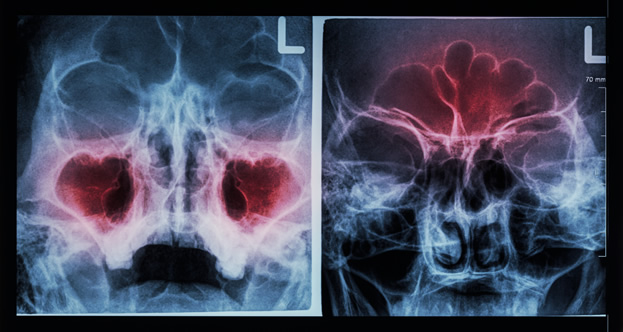Sinus Headache Treatment Glendale & Burbank

Sinus headaches are associated with a swelling of the membranes lining the sinuses. Pain occurs in the affected region the result of air, pus, and mucus being trapped within the obstructed sinuses. The discomfort often occurs under the eye and in the upper teeth. Sinus headaches tend to worsen as you bend forward or lie down. The key to relieving the symptoms is to reduce sinus swelling and inflammation and facilitate mucous drainage from the sinuses.
Treatment
There are several at-home steps that help prevent sinus headache or alleviate its pain. They include:
- Breathe moist air
- Alternate hot and cold compresses
- Nasal irrigation
- Over-the-counter medications
- Decongestants
If none of these at home measures or treatments is effective, a visit to our office may be warranted. During the examination with Dr. Bublik, a CT scan of the sinuses may be ordered to determine the extent of blockage caused by chronic sinusitis.
Sinus Headache Treatment FAQ:
-
What is a sinus headache? A sinus headache occurs when the sinus cavities become inflamed and swollen due to infection, allergies, or other triggers, leading to pressure and pain in the forehead, cheeks, or around the eyes.
-
What causes sinus headaches? Sinus headaches are typically caused by sinusitis, where the sinus cavities become blocked and filled with mucus. Common triggers include colds, allergies, nasal polyps, and bacterial or fungal infections.
-
How is a sinus headache different from a migraine? Sinus headaches are related to sinus inflammation and are often accompanied by nasal congestion or discharge. Migraines, on the other hand, are neurological and may include symptoms like nausea, light sensitivity, and throbbing pain. Sometimes, migraines are mistakenly diagnosed as sinus headaches.
-
What are common treatments for sinus headaches? Treatments include over-the-counter pain relievers like ibuprofen, decongestants, nasal sprays, antihistamines (if caused by allergies), saline nasal rinses, and applying warm compresses to relieve sinus pressure. In more severe cases, antibiotics may be necessary for bacterial infections.
-
Can home remedies help with sinus headaches? Yes, home remedies like steam inhalation, staying hydrated, using a humidifier, or applying a warm towel to the face can help alleviate sinus pressure and pain.
-
When should I see a doctor for a sinus headache? If your sinus headache persists for more than 10 days, is accompanied by fever, swelling, or vision problems, or doesn’t respond to over-the-counter treatments, it’s important to consult a healthcare provider.
-
Can allergies cause sinus headaches? Yes, allergies can lead to sinus inflammation, causing blockages and pressure in the sinus cavities, which may result in sinus headaches. Treating the underlying allergy often helps reduce sinus headaches.
-
What are the best medications for sinus headaches? Over-the-counter decongestants, antihistamines (for allergies), nasal steroid sprays, and pain relievers like acetaminophen or ibuprofen are commonly used. In some cases, doctors may prescribe antibiotics if a bacterial infection is the cause.
-
Can chronic sinus headaches be treated with surgery? If sinus headaches are caused by chronic sinusitis that doesn’t respond to medical treatment, surgical options like Balloon Sinuplasty or Functional Endoscopic Sinus Surgery (FESS) may be recommended to open blocked sinuses and relieve pressure.
-
Are there any long-term treatments to prevent sinus headaches? Yes, if your sinus headaches are due to chronic sinusitis or allergies, long-term treatments like allergy management (antihistamines, immunotherapy), nasal corticosteroids, and maintaining good sinus hygiene (using saline rinses) can help prevent future headaches.
